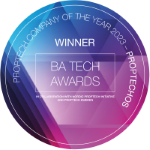To drive business development, commercial real estate needs to implement a Building Operating System (BOS) based on standards that will make it easy to develop digital twins of their buildings.
This type of operating system (BOS) can open new possibilities for IT managers to support their focus on developing innovation for operational efficiency, environmental certifications, tenant services, and much more based on data that can transform into actionable insight.
There are several different stakeholders involved in making this vision of a digital twin operating system a reality. Microsoft is the leader in developing Azure Digital Twins and Microsoft’s open-source Smart Buildings Digital Twins Description Language (DTDL). They have decided to base DTDL for smart buildings on the RealEstateCore ontology, and they have been a member of the consortium since 2021.
The application can remove barriers and enables digital twins’ fast and cost-effectively creation for the real estate business.
The DTDL-based RealEstateCore ontology will accelerate development by not needing to start from a”blank page” and facilitate business-to-business integrations between vendors in a smart building. Since the DTDL-based ontology is open-sourced, developers can easily extend the existing model by contributing with their domain expertise.
Use DTDL and RealEstateCore for Digital Twins
Initiatives like DTDL and RealEstateCore are the foundation for building an operating system that is actively used for developing applications fast and maintaining them over time. An operating system for real estate needs to provide core functionality such as:
- Data: Collaborative digital twins from native data (blueprints, BIM, and BMS tag lists). RealEstateCore knowledge graph, real-time telemetry, and historical data.
- Applications: Ready to use apps by certified partners for insight, optimization, automation, and new services.
- SDKs and APIs make for the best foundation for new apps.
- Scale: Integration and IoT operations at scale. Partners auto-provision via the API.
ProptechOS and RealEstateCore originate from the idea that no single system or data compilations can be as complete, accurate, or valuable as the combination of multiple sources.
Implementation of digital twin operating system
Implementing an operating system for digital twins is a smooth process that you should incorporate based on your business needs. Therefore, Idun Real Estate is offering ProptechOS to be implemented based on a SaaS scale-up model where you buy access to the Building Operating System based on the needs of the applications you want to implement. The implementation is easy to set up from a technical perspective. The ROI in the business applications combined with the operating systems will also give you a more appealing decision further down the line.
The key to success is to implement an IT infrastructure that will enable the business to develop data-driven applications fast and based on business needs. It is a challenging time for IT managers, but the opportunity for IT to deliver future value for the industry is huge.
In this guide you will learn more about:
- The challenges that you need to master to become a truly data-driven business
- Possible ways of enabling integration capabilities in your organization
- The specifications for a Building Operating System (BOS)
- How to get started with implementing a modern Building Operating System (BOS)
Take your first step and download the guide here:
Talk to our sales team to discuss how ProptechOS can solve your use cases and get to know the features of ProptechOS. Find a time that suits you and book a call with our sales team.

Dr. Erik Wallin
Chief Ecosystem Officer, and founder of ProptechOS and RealEstateCore is recognized as a leader in Building Operating Systems (BOS) and making the buildings of the world smarter. He holds an MSc and a Ph.D. in Media and Computer Science from KTH Royal Institute of Technology.
Read his full bio and information here.

